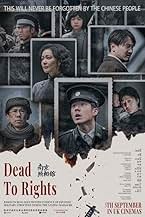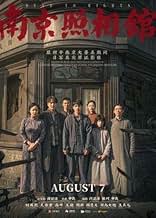Durante la masacre de Nanjing en 1937, el cartero A Chang fingió ayudar a japoneses como fotógrafo mientras ocultaba refugiados chinos y después reveló las atrocidades.Durante la masacre de Nanjing en 1937, el cartero A Chang fingió ayudar a japoneses como fotógrafo mientras ocultaba refugiados chinos y después reveló las atrocidades.Durante la masacre de Nanjing en 1937, el cartero A Chang fingió ayudar a japoneses como fotógrafo mientras ocultaba refugiados chinos y después reveló las atrocidades.
- Dirección
- Guionistas
- Elenco
- Premios
- 3 premios ganados y 5 nominaciones en total
- Dirección
- Guionistas
- Todo el elenco y el equipo
- Producción, taquilla y más en IMDbPro
Opiniones destacadas
As someone who has volunteered in oral history projects documenting this period, I was impressed by the film's meticulous attention to historical detail. The production did its homework-many archival elements mirrored materials I've encountered in my research. The inclusion of subtle but telling details demonstrates a rare commitment to authenticity that will resonate with history-conscious viewers.
From a filmmaking standpoint, this movie occasionally prioritizes structural precision over emotional release. Certain third-act transitions feel abrupt or awkward. This approach risks making pivotal moments feel more academic.
That said, these are minor quibbles against the film's achievements. The ensemble cast breathes life into the painstakingly recreated era, and the central metaphor of photography as both weapon and witness remains haunting. A worthy addition to the canon of historical cinema-one that treats its subject with both scholarly respect and cinematic craft.
From a filmmaking standpoint, this movie occasionally prioritizes structural precision over emotional release. Certain third-act transitions feel abrupt or awkward. This approach risks making pivotal moments feel more academic.
That said, these are minor quibbles against the film's achievements. The ensemble cast breathes life into the painstakingly recreated era, and the central metaphor of photography as both weapon and witness remains haunting. A worthy addition to the canon of historical cinema-one that treats its subject with both scholarly respect and cinematic craft.
First of all, never heard of these events before. The movie blasted that ignorance with incredible cinematography, powerful imagery and realism, and natural acting by the cast. Yes, its in Mandarin language and have to read subtitles, yet the movie draws you in, and is extremely immersive. Its also brutal to reflect the harsh realities, so be prepared. Its definitely a must watch in theatre - the color grading, lighting and sets are just beautiful. This movie exposes human harshness like Schindler's list did. The English title of this film is odd.
This is not a movie to be enjoyed. Throughout my watch, I feel my intestines knotted from the blatant display of innumerable brutalities during the Rape of Nanking that were unfathomable strategically and ethically. Not a single body of water in the film isn't red, all bloodied by the 300,000 "swines" that were humans. Laudably, unlike some Sino-Japanese War movies that are purely slogan-calling and hostility-instigating, Dead to Rights has a rather impartial and documentary narrative stance, moving the audience by painstakingly replicating the massacre and letting the plot do the talking. While it's typical in this genre of films to vilify the invaders and traitors, Dead to Rights portrays two brilliant counterexamples: Ito's performative kindness and intrinsic cowardice and Guanghai's suppressed sentiments and deepest despair. With that said, performance of all seven protagonists are spot-on, making the choices, sacrifices and sufferings, though mostly fictional truly believable and resounding. Bravo specifically to Gao Ye, who perfectly captures Yuxiu's change from resiliently hopeful to defenselessly abused to reclaiming justice and avengement, as her powerless tears reflect the most inhumane violations done to countless comfort women. In all, Dead to Rights is a soul-stirring piece of work, but please be prepared for the historical pain it conveys. To intrusion and trampling, I shall retaliate with survival and remembering.
This film must be seen in theaters. The world needs to know what Japan did the past . The atrocities they committed in China were mirrored in Malaysia, where they similarly tortured and slaughtered our people. Let us cherish the prosperity and happiness of our nation today, and never forget the lessons of history. We must never forget the lessons of history.
10WayS-9
This film, the second big-screen work by young genius director Shen Ao, yet it showcases rare talent. Its restraint in depicting brutal history, masterful use of cinematic language, skillful orchestration of audience emotions, and its unwavering focus on the perspective of ordinary citizens-victims of the war-all lead me to believe it can rival, or even surpass, classics like Schindler's List, solidifying its place as another landmark in WWII cinema.
This film, under the influence of militarism and fascism, shows how anyone-whether Japanese soldiers from poor backgrounds or young people from noble families-can be reduced to beasts. They no longer regard other humans as their own kind, thus massacring and insulting others without any qualms. I hope everyone will have the chance to watch this film in theaters, not merely because of the historical grievances between the Japanese and Chinese peoples. But because each of us, after seeing it, should reflect on a question: On the 80th anniversary of the victory in the Anti-Fascist War, has the world truly ended its war against fascism and militarism? In today's world of 2025, have such massacres and acts of extermination finally vanished?
This film, under the influence of militarism and fascism, shows how anyone-whether Japanese soldiers from poor backgrounds or young people from noble families-can be reduced to beasts. They no longer regard other humans as their own kind, thus massacring and insulting others without any qualms. I hope everyone will have the chance to watch this film in theaters, not merely because of the historical grievances between the Japanese and Chinese peoples. But because each of us, after seeing it, should reflect on a question: On the 80th anniversary of the victory in the Anti-Fascist War, has the world truly ended its war against fascism and militarism? In today's world of 2025, have such massacres and acts of extermination finally vanished?
¿Sabías que…?
- TriviaThe film is loosely based on the discovery of a key piece of evidence from the Nanjing Massacre. In 1938, 15-year-old darkroom apprentice Luo Jin secretly compiled photos of the atrocities-taken by Japanese soldiers-into an album and hid it. The album was later discovered by Wu Xuan, another Chinese civilian, who preserved it for years before handing it over to postwar authorities.
- Créditos curiososAs the closing credits came on, a hand puts up black and white photographs of old Nanjing and superimpose it on the same spot of where it was taken in modern-day Nanjing.
Selecciones populares
Inicia sesión para calificar y agrega a la lista de videos para obtener recomendaciones personalizadas
Detalles
Taquilla
- Total a nivel mundial
- USD 598,322
- Tiempo de ejecución
- 2h 17min(137 min)
- Color
Contribuir a esta página
Sugiere una edición o agrega el contenido que falta




























